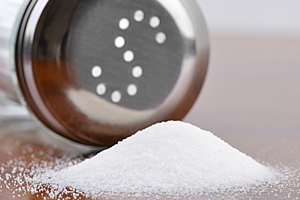What makes research worth publishing? ClinicalTrials.com lists 173,000 medical research drug trials that are currently running. Having a study published in one of the major medical journals gives the research credibility and visibility, and the publication of the study findings influences medical care in the US and beyond. So why would the New England Journal of Medicine (NEJM) waste the space publishing 3 studies that, separately or combined, do not add to our knowledge of salt’s role in cardiovascular death?
More than a year ago I blogged Salt in the Wound after I reviewed new studies on salt intake and came to the conclusion that common sense and some actual consumption data indicated that most people consume more than 3,000 and less than 6,000 mg of salt daily, and for most people that’s just fine. However, money and precious publishing space (with the medical credibility that goes with it) has been spent on 3 new studies that I think are quite close to a waste of time and space.
Forget what I think. The editor of the NEJM highlights significant flaws and limitations that keep each of the 3 studies from adding conclusive insight to just how much salt is OK.
One study, called Prospective Urban Rural Epidemiology (PURE), took urine samples over 24 hours from 100,000+ people from 17 countries and followed up 3.7 years later to tally who’d died from cardiovascular disease. Really? It takes decades to develop cardiovascular disease, not 3.7 years. Salt intake would have to be consistently high, not just over the course of 1 day. Their conclusion (my review of research is highly simplified because I’m NOT a medical researcher) is that both too little salt and too much salt is not good for you.
The second study reported was highly similar, with 102,000+ participants in 18 countries using one urine sample only from each person. Similar conclusions. Ditto on the limitations of the study.
Plus, both of these new studies are observational studies which have the flaw that correlation does not mean causality — they only looked at salt intake without controlling for other possible causes, so no clear conclusion can be drawn.
A third study funded by the Bill and Melissa Gates Foundation also showed too much salt is bad. However, the editorial in the NEJM concluded that the high number of assumptions made by the research team in composing this computer-modeling research meant that “caution should be taken in interpreting the findings of the study.”
Why is everyone reporting the same research over and over? We’ve been hearing that we should lower our salt for several decades and we still have no proof. A study that correlates hypertension – a key indicator of heart attack risk – with high levels of salt is not news and should not take up valuable, limited journal space.
Here are the questions I would like the answers to:
- Does it matter if the salt was from processed vs. whole vs. preserved foods?
- Can I counteract salt overindulgence with potassium supplements?
- Is the same salt intake OK for one person and harmful to another?
- Do weight and sex play a role?
- What if I have a huge tub of salted popcorn at the movies every Saturday night for a year, but otherwise my salt is in the normal range, say 3,500 mg?
- Does withholding salt really help with bloating? (OK, off topic but I’d still like to know.)
Where are the gold standard studies that we can use?







